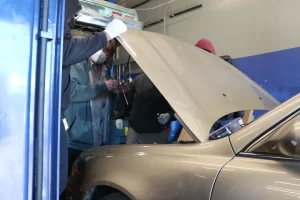Some consider these job titles interchangeable when talking about automotive technician vs. mechanic. In the most fundamental sense, both jobs require training and repairing vehicles. Nonetheless, the daily duties for each role can vary. Here, we discuss the differences between an automotive technician and an automotive mechanic.
An automotive technician analyzes, repairs, and conducts routine maintenance for automotive vehicles of all types. They generally focus primarily on diagnostic services, identifying what results in more significant vehicle problems. Technicians use specialized computers and appliances to offer suggestions and plan repairs. While numerous technicians work in car dealerships and repair shops, they may also operate in more specialized settings, like the pit crew for a race car team.
What Is An Automotive Mechanic?
An automotive mechanic inspects, repairs, and maintains numerous types of automotive vehicles. Most automotive mechanics emphasize conducting routine maintenance. Nonetheless, some mechanics specialize in a distinct part or type of repair, like engines, tires, or brakes. Whether they repair whole cars or focus on one place, most mechanics work in repair stores or car dealerships.
Auto technicians and auto mechanics have a lot of differences. All automotive technicians are mechanics, but not all automotive mechanics are technicians. Those within the automotive enterprise often perceive technicians as more developed jobs, but both jobs need special skills. On the other hand, an auto technician has a more technical role and requires more education or certification. Here are the major differences between these roles:
Auto mechanics and technician in automotive function side-by-side in repair shops. Their everyday tasks focus on repairing automobiles and helping customers. While the jobs are identical, some of their daily tasks vary. Common responsibilities for an automotive mechanic may include:
An automotive technician may conduct the duties above, but their responsibilities may comprise the following:
Performing routine repairs or maintenance as an auto mechanic or technician may comprise automotive technician programs like:

Most mechanics and technicians specialize in a respective field, such as:
One of the great things about seeking a mechanic or automotive technician career is that numerous industries you can go into are here to stay.
The average wage for a mechanic automotive in the US is $20.61 every hour, and the average salary for an automotive technician in the US is $20.06 per hour. Every employer specifies their payment structure differently. Earnings for automotive mechanics and technicians vary based on facets such as:
In addition to the wage, many industries provide additional benefits, like paid time off and health insurance.
The work setting for auto mechanics and technicians is often identical. Most work in repair shops, whether at independent shops or car dealerships. While the precise nature of the setting varies for each shop, some factors to expect include the following:

Some auto technicians function in more specialized roles, like a race car pit crew member, where the work setting may differ. Nonetheless, the most important features of concentrating on safety, working efficiently, and accurately operating complex devices remain the same.
Read More: